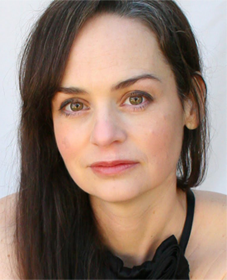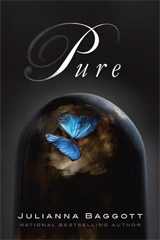 Today I am interviewing Julianna Baggott, national bestseller and author of the Pure series.
Today I am interviewing Julianna Baggott, national bestseller and author of the Pure series.Here's my review of Pure.
Find Julianna Baggott on:
Website | Twitter | Goodreads
What made you write/want to write a dystopian/sci fi novel? Besides finishing the Pure series, do you think you'd ever write another dystopian/sci fi, or do you think you'll venture out?
As I've written over a dozen books (across genres), I might write just about anything. I've fallen in love with dystopian. (And I don't think PURE can be defined as truly sci-fi.) I'm a buckshot writer. I don't think much of definitions and boundaries. I do think of audience but usually try to narrow that audience (while writing) to one person. (PURE is dedicated "To Phoebe -- who made a bird of wire" -- my daughter who is now 16, the age of the main character.) I've ventured far and wide and will probably keep venturing out and returning to landscapes I love.
Pressia is such a unique name - how did you come up with it?
Names are very strange. They come to define characters, sharpen them, make them real. I collect names just as I collect images and places and gestures and phrases ... Writers are collectors of odd things.
Is there a certain thing you found yourself doing a lot while writing? (listening to music, taking frequent breaks, drinking or eating certain things?)
I do take breaks. I'm a grazer so eat, return, eat, return. I also have 4 kids, 2 dogs and a cat so interruption is part of my creative process. Sometimes I'll crank a song. Things are desperate then, and sometimes I have to go out and drive. Just see scenery shifting by.
How do you handle negative reviews - do you read them or ignore them?
Some are really important to hear, especially with the first book in a trilogy. They sometimes shape the way I talk about a book, too. Others simply don't resonate with me so I can't really learn much from them. And then, occasionally, there will be a line of a review that's really damaging. Writing is such deeply personal and psychological work and writers tend to be the raw types -- born that way. There was a review in 2003 and one line was so devastating -- to me as a woman writer -- that it really changed what I was willing to hand over. It's a strange and delicate process, going public with your work. I know that I'm paid to do it, but that makes it no less personal.
How much research did you have to do for Pure?
A lot of research went into PURE. In particular, I read a good bit about the bombings on Hiroshima and Nagasaki, the images of the aftermath as well, which made a huge impression on me not only as a writer but as a human being. And with much of the speculative parts of the novel, I researched a lot innovation in science. Incredible things are already being invented out there. That was truly humbling.
Fun question: If you could write your next book/next addition to the Pure series anywhere in the world, where would you write it?
I can't write in places where I'm distracted by a foreign language -- even accents new to me. I love language so much that it completely derails me... So I'd better -- at least for the writing itself -- not wander too far.

We know you are here, our brothers and sisters...
Pressia barely remembers the Detonations or much about life during the Before. In her sleeping cabinet behind the rubble of an old barbershop where she lives with her grandfather, she thinks about what is lost-how the world went from amusement parks, movie theaters, birthday parties, fathers and mothers . . . to ash and dust, scars, permanent burns, and fused, damaged bodies. And now, at an age when everyone is required to turn themselves over to the militia to either be trained as a soldier or, if they are too damaged and weak, to be used as live targets, Pressia can no longer pretend to be small. Pressia is on the run.
Burn a Pure and Breathe the Ash...
There are those who escaped the apocalypse unmarked. Pures. They are tucked safely inside the Dome that protects their healthy, superior bodies. Yet Partridge, whose father is one of the most influential men in the Dome, feels isolated and lonely. Different. He thinks about loss-maybe just because his family is broken; his father is emotionally distant; his brother killed himself; and his mother never made it inside their shelter. Or maybe it's his claustrophobia: his feeling that this Dome has become a swaddling of intensely rigid order. So when a slipped phrase suggests his mother might still be alive, Partridge risks his life to leave the Dome to find her.
























0 comments:
Post a Comment
Thank you for considering me, but this blog is an award free zone for my own personal reasons.